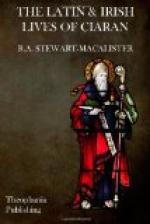The Saying of Alexander.—I regret to have to acknowledge that I have been unable to get on the track of any explanation of this appendix to the incident, as related in VG. It is probably a marginal gloss taken into the text. The “Alexander” is presumably one of the popes of that name, and if so, must be Alexander II (1061-1073), as the first Pope Alexander is too early, and the remaining six are too late. I have, however, searched all the writings bearing his name without discovering anything like this saying, nor can I trace it with the aid of the numerous indexes in Migne’s Patrologia.
XXIII. THE BLESSING OF CIARAN’S FOOD (LA, LC)
I cannot find any authority for the ritual indicated by this curious story, in which the blessing of a second person is necessary before food can be consumed. There is a Jewish formula described by Lightfoot,[17] in which, when several take their meals together, one says Let us bless, and the rest answer Amen. But it is not clear why a response should have been required by a person eating alone.
XXIV. THE STORY OF THE MILL AND THE BAILIFF’S DAUGHTER (LB, VG)
The full details of this narrative have evidently been offensive to the author of LB, who has heroically bowdlerised it. It is obviously an independent Maerchen, which has become incorporated in the traditions of Ciaran.
The Famine.—Famines are frequently recorded in the Irish Annals: and it is noteworthy that they were usually accompanied by an epidemic of raids on monasteries. The wealth of the country was largely concentrated in these establishments, so that they presented a strong temptation to a starving community. The beginning of the story is thus quite true to nature and to history, though I have found no record of a famine at the time when we may suppose Ciaran to have been at Clonard.
Transformation of Oats to Wheat, and of other Food to Flour.—Such transformations are common in the saints’ Lives. We read of swine turned to sheep (CS, 879), snow to curds (LL, 127), sweat to gold (TT, 398) flesh to bread (CS, 368). The later peculiarities of the food—bread or some other commonplace material having the taste of more recondite dainties, and possessing curative properties—are not infrequently met with in folk-lore. Saint Illtyd placed fish and water before a king, who found therein the taste of bread and salt, wine and mead, in addition to their proper savours (Cambro-British Saints, pp. 165, 474).




